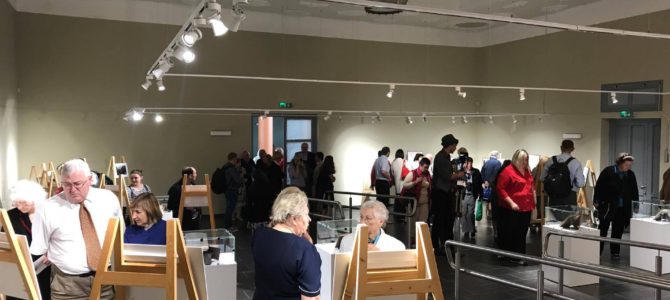
The Lietuvos Rytas television program Travel with a Reporter features Ukmergė (Vilkomir) Jewish Community chairman Artūras Taicas and discusses the former Jewish community in the Lithuanian town.
Watch the program in Lithuanian here.

The Lietuvos Rytas television program Travel with a Reporter features Ukmergė (Vilkomir) Jewish Community chairman Artūras Taicas and discusses the former Jewish community in the Lithuanian town.
Watch the program in Lithuanian here.
Dear Community member,
One family with children who are clients of the LJC Social Department need your help.
Recently the family lost their computer and television. Thanks to members who have already responded, the family now has a television, but the children still need a computer for school and are unable to afford one.
If you can help or know someone who can, please contact the LJC Social Programs Department Family Program coordinator by telephone at 865213146 or by email at rasheles@sc.lzb.lt
Thank you for caring!
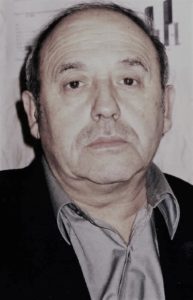
The Lithuanian Jewish Community has lost an outstanding member and long-time friend. Boris Olšanickij was born September 16, 1937 and passed away July 16, 2017. He in earlier times was the director of the LJC’s Social Center. He passed way before we could thank him for all his service on his 80th birthday, just two months away.
Our deepest condolences to his family, loved ones, former colleagues and friends.
In the battle for fifth place, the Lithuanian Makabi Athletics Club mini-soccer team won against Mexico in penalty kicks July 16, repeating their achievement back in 1989. Falling behind 1:4, the boys rallied and Mexico was tied with Lithuania 6:6. Markas Plineris made the winning goal in penalty kicks.

Dear Community member,
If you have a yearning to paint, like art, enjoy nature and good company, you won’t want to miss this year’s educational plein air outdoor painting workshop, our third in as many years.
The plein air painting workshop will last 5 days and 4 nights at an inspiring rural location under the direction of the famous painters Raimondas Savickas from Lithuania and Alexander Ganelin and Anna Khodorkovski, both from Israel.
The workshop will be held at the Įlanka farm on Bebrusas Lake in the Molėtai region where participants will spend four nights. Three meals per day will be provided (with vegetarian options). Daily work includes practical activities and one-on-one consultation with teachers, painting and other media, and an education/free-time program including a ride on the Švyturys recreational ferry across the lake, a sauna, cultural events and a Sabbath ceremony.
The cost for Community members is 150 euros. Please register by noon, July 18, because space is limited.
After sending the sum by bank transfer please send a copy of the payment form to zanas@sc.lzb.l
For more information and registration, contact:
Žana Skudovičienė by email at zanas@sc.lzb.lt or by telephone at + 370 67881514.
Details for payment:
to: Lietuvos žydų (litvakų) bendruomenė [Lithuanian Jewish Community]
company code 190722117
tax code: LT100010504214
bank account number: LT09 7044 0600 0090 7953
bank: AB SEB bankas
Please indicate the payment is for “Edukacinis pleneras 2017” [Educational Plein Air 2017] (and indicate the name of the person for whom payment is made).
The Educational Plein Air Outdoor Painting Worskhop 2017 is made possible by the Lithuanian Jewish Community, the Goodwill Foundation and the Joint Distribution Committee

from Jewish Heritage Europe
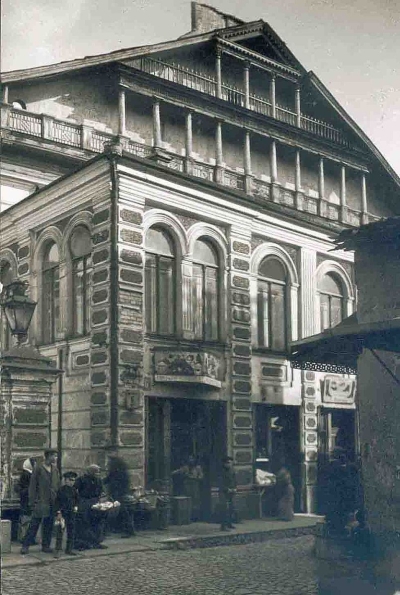
The second season of archaeological excavations is under way at the site of the destroyed Great Synagogue in Vilnius and the surrounding Shulhoyf complex of Jewish buildings. A team of Israeli, Lithuanian and American volunteers began work on July 10 and will continue until July 21.
The objective is to continue last year’s work researching the water system of the complex developed in the 18th century and two mikvaot, ritual baths. Plans are to open “an area … probably near the entrance staircase descending into the synagogue and around the area of the bimah.”
Dear all,
The Vilna Gaon State Jewish Museum and the embassy of the United States of America in Vilnius kindly invite you to a screening of the documentary film “Holocaust Escape Tunnel” at the museum’s Tolerance Center (Naugarduko St. 10/2, Vilnius) on Tuesday, July 18, at 5:30 P.M. The screening will be followed by a discussion with the archaeologists featured in the film.
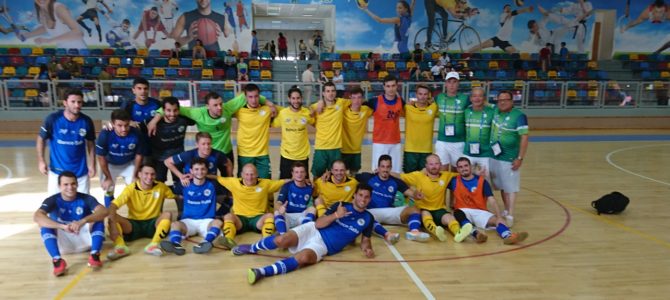
The Lithuanian Makabi mini-soccer team’s match with Brasil at the “Jewish Olympics,” ended in a tie, 3:3.
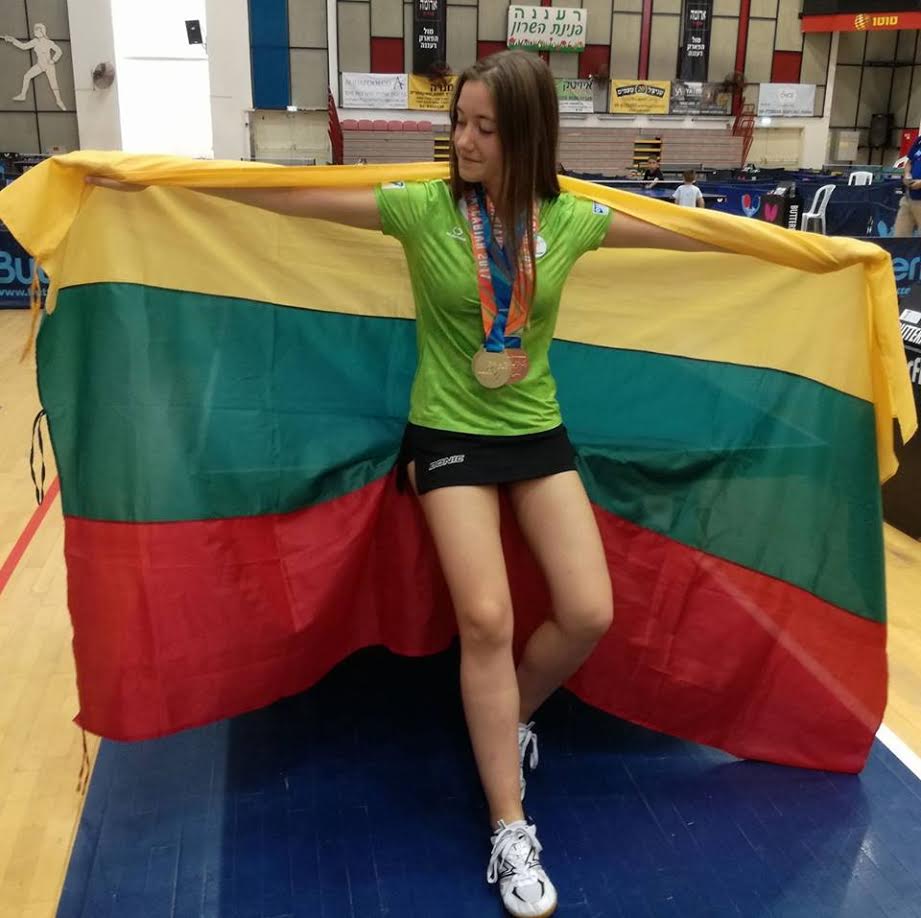
Neta Alon won a gold medal in singles youth table tennis competition and another gold medal in mixed doubles youth play with Israeli Janin Karmazin. Congratulations!
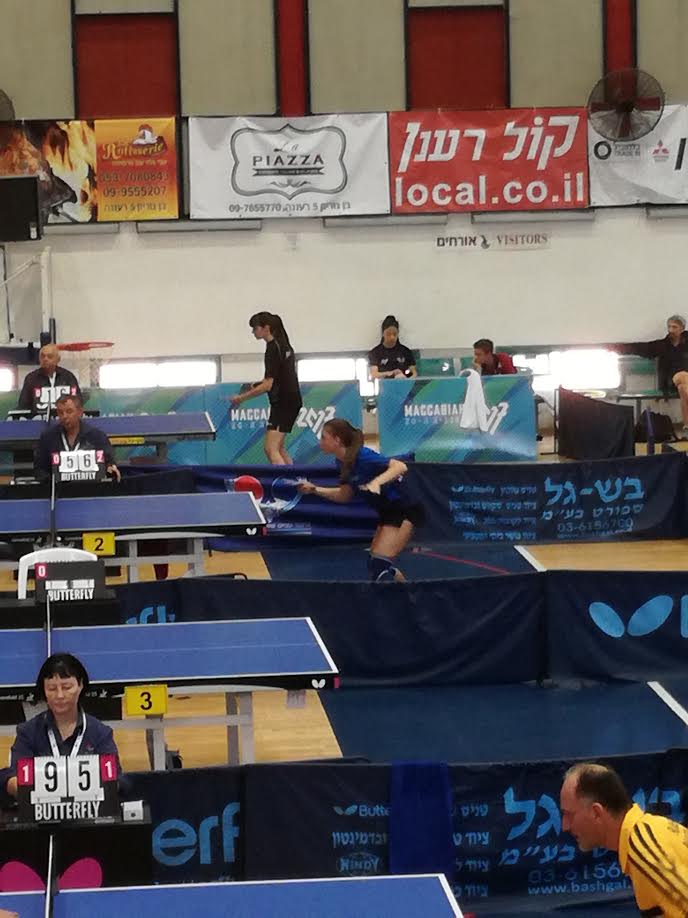
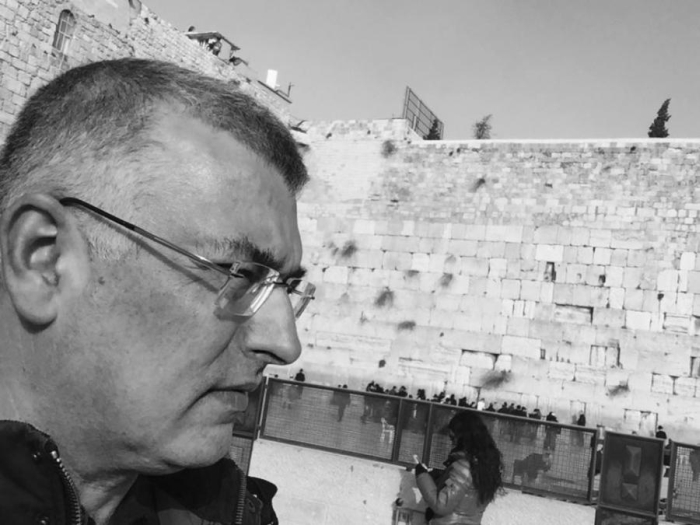
by Sergejus Kanovičius
bernardinai.lt
July 29, 2016
Recently members of the City of Vilnius’s Commission of Names, Monuments and Memorial Plaques (hereinafter the City Commission) visited these issues.
Members of the Commission apparently didn’t feel a lack of expertise in the matters at hand and didn’t seek the advice of the Lithuanian Language Commission on how to write Washington Square (there is no W in Lithuanian, but in any case it wasn’t Wrocław), didn’t ask for public input on Ukraine Square and felt confident enough to deliberate on issues related to commemorating Jonas Basanavičius.
But one question was the subject of much–how to say it precisely–profound avoidance of responsibility and competence. This was the issue connected with Vilnius City Council member Mark Harold’s statement in which he argued for renaming Kazys Škirpa Alley the Alley of the Righteous Gentiles. What did the Commission do? The Commission said they didn’t know what to do. They asked for help from another institution which, also not knowing what to do, issued historical reports on Škirpa full of evasions (he didn’t take part in mass murder because the Germans wouldn’t allow him to travel, he didn’t murder anyone personally, he was just the head of the anti-Semitic LAF and called for getting rid of the Jews in this manner: “Having examined the anti-Semitic statements encountered in texts prepared by the Berlin LAF organization, it can be stated its members proposed solving ‘the Jewish problem’ not through genocide, but by means of driving them out of Lithuania.” This is a quote [translated] from Center for the Study of the Genocide and Resistance of Lithuanian Residents director T. B. Burauskaitė’s history report sent to the head of the municipal administration of Kaunas).
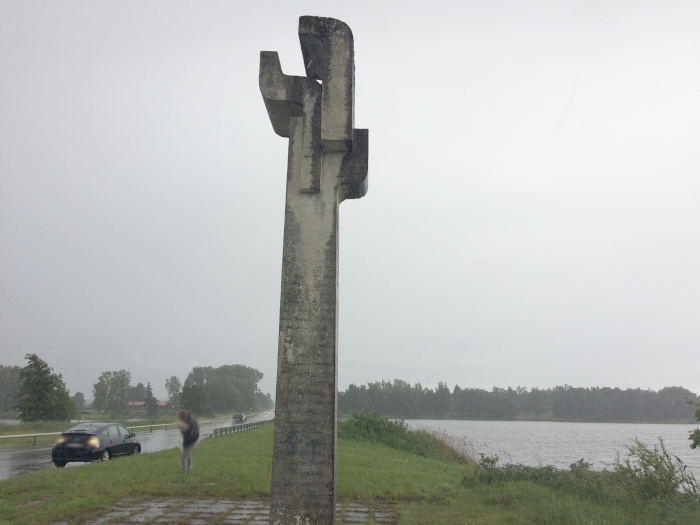
by Geoff Vasil
I entered Kaišiadorys in a pounding rain to see the Soviet monument the local residents want removed.
Visibility was perhaps 10 feet as I passed what seemed to be farmsteads and fields. Up ahead the road bisected a rather beautiful little lake. A weird light enveloped the scene, black clouds on one side and open blue sky on the other, with cattails, a bright green made neon against dark gray.
The monument appeared there on the other side of the lake right by the road, looking for all the world like a broken-down chimney of an abandoned factory, but surrounded by a natural idyll the summer squall was unable to diminish.
The monument itself has no inscription. It might have, once upon a time, but there was no evidence even of a stolen metal plaque, no holes for bolts, no tell-tale metal stains dripping down from an empty space anywhere on its face. The only thing close to an inscription was some faded graffiti, some message left in blue spray-paint but now illegible.
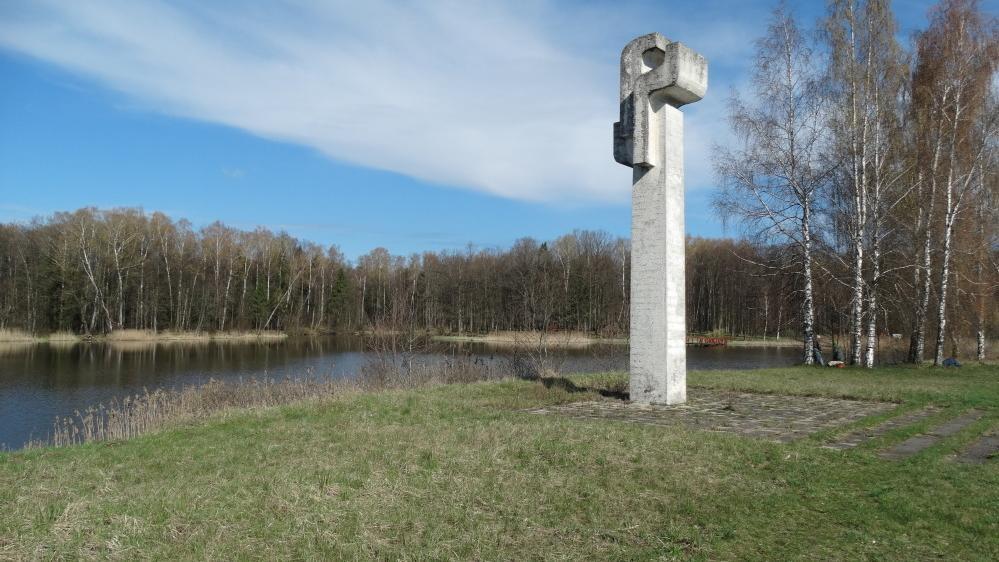
by Daiva Baronienė
daivabaro@lzinios.lt
www.lzinios.lt
A survey of people living in Kaišiadorys, Lithuania, or hailing from there found the majority don’t want an obelisk commemorating Nazi victims, a Soviet relic. Photo: www.kaisiarodys.lt
A public opinion survey in Kaišiadorys determined the majority of residents and people from the town who are currently abroad or living abroad no longer want the obelisk to victims of the Nazis to stand at the entrance to the town.
Kaišiadorys regional administration head Vytenis Tomkus’s wish to greet the 100th anniversary of Lithuanian independence next year after having removed from the region sites and constructions which don’t correspond to the ideological values of today is gaining momentum. A poll of residents over the period of one month asking whether they need to monument to victims of the Nazis to remain standing in Kaišiadorys or not found that the majority of informants in the rather active survey are convinced the town does not need this sort of monument.
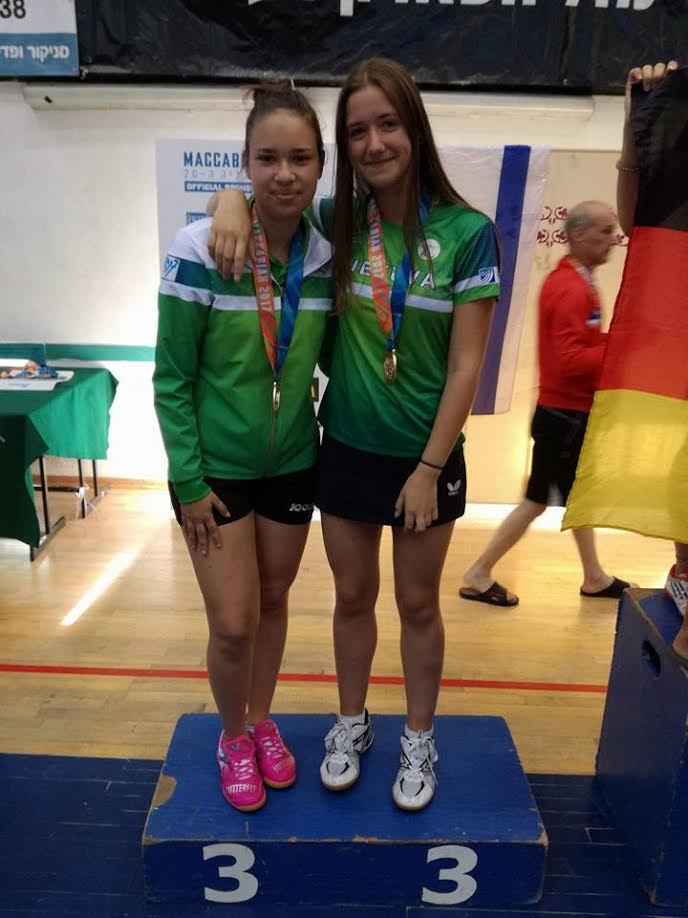
Table tennis team-play competition medal winners Neta Alon and Vanesa Ražanskytė.
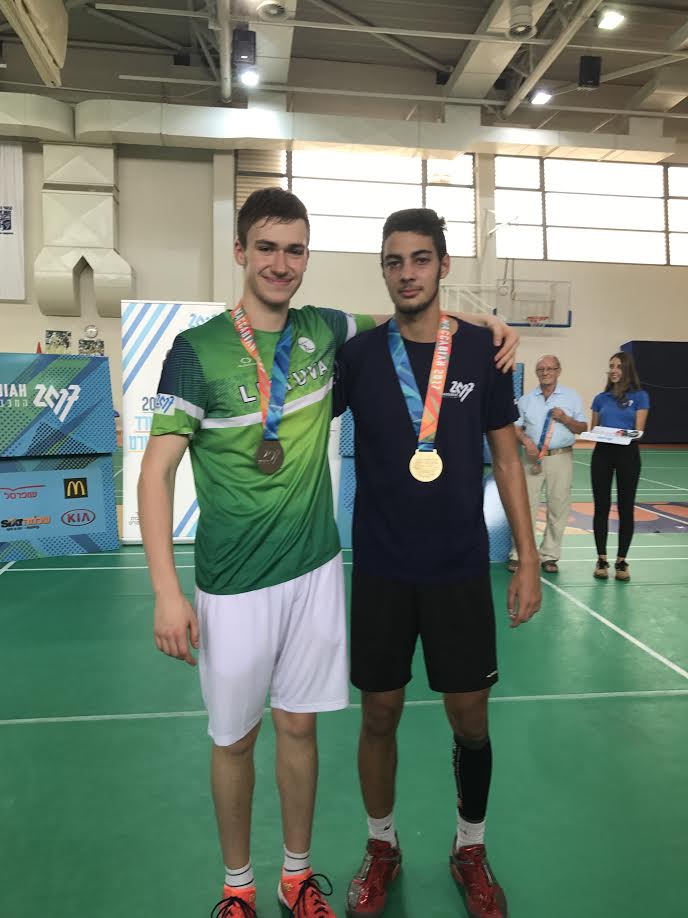
Markas Sames took silver in one-on-one youth badminton competitions.
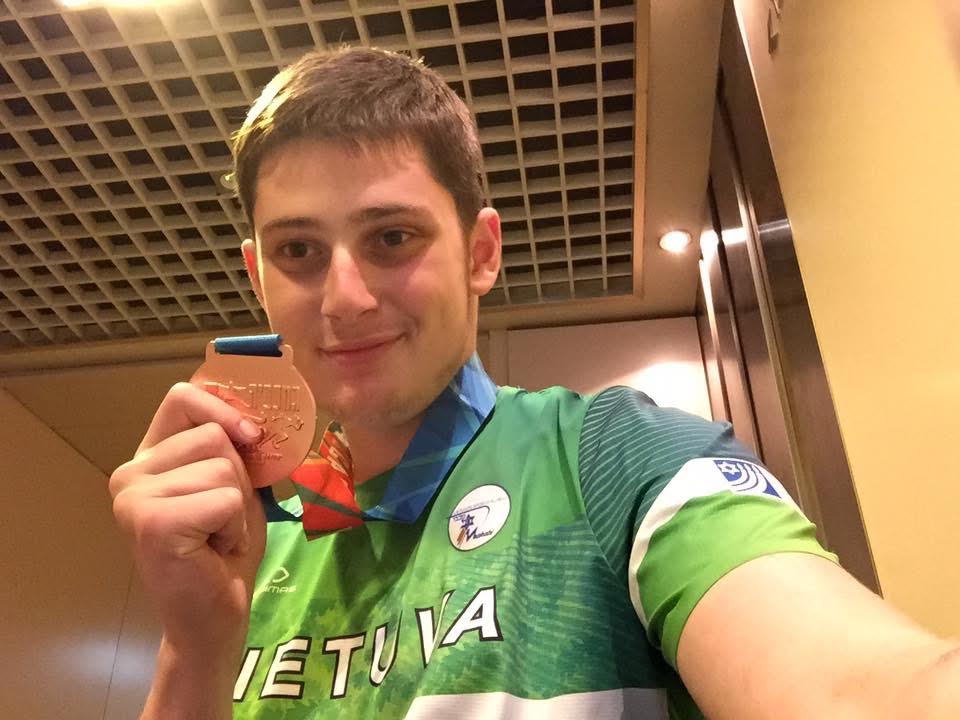
Danielius Tarachovskism won a bronze medal in mixed doubles youth badminton.
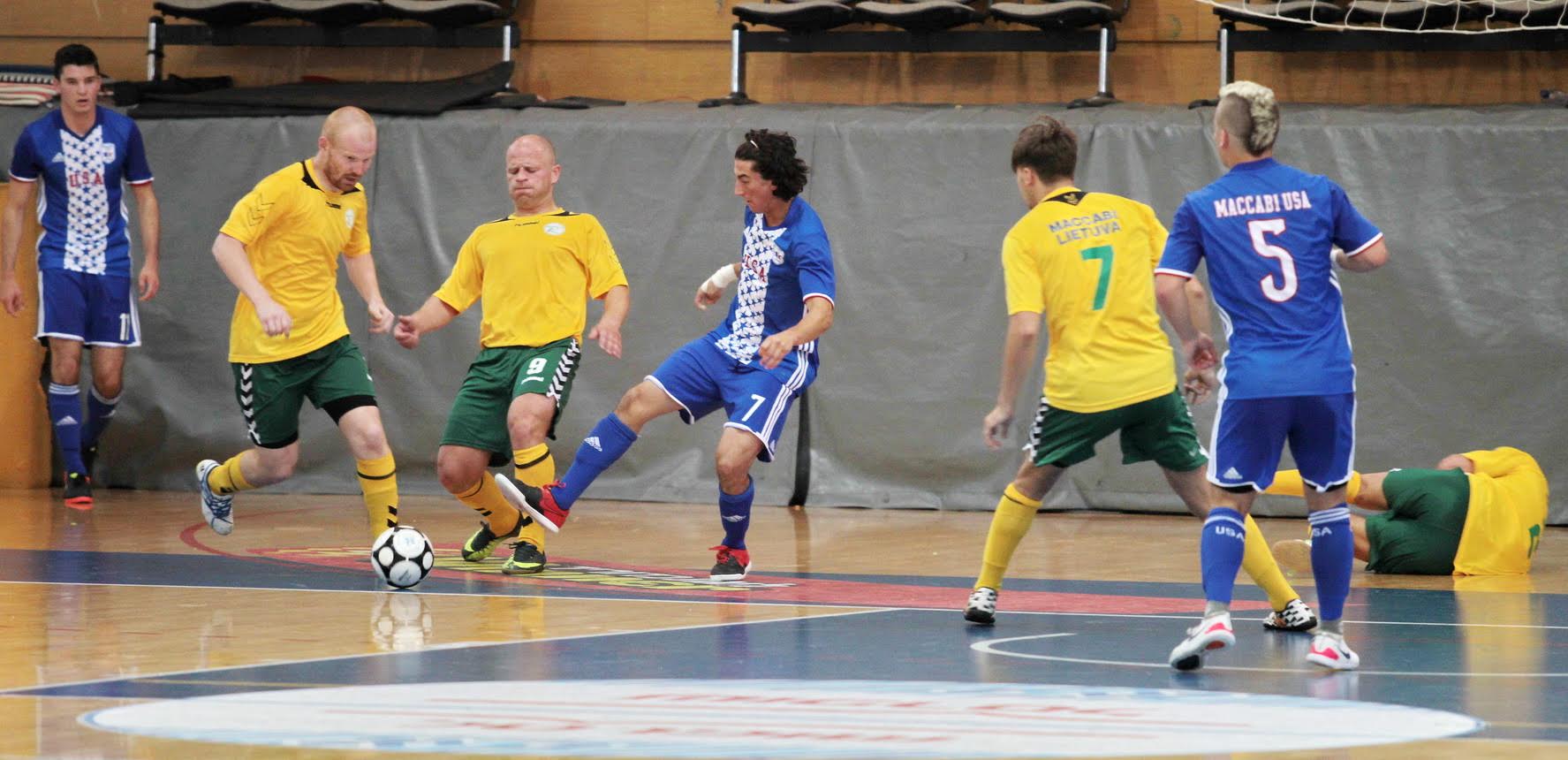
Photographer Dovydas Fligelis captured a moment from a mini-soccer match between Lithuania and the USA (3:1).
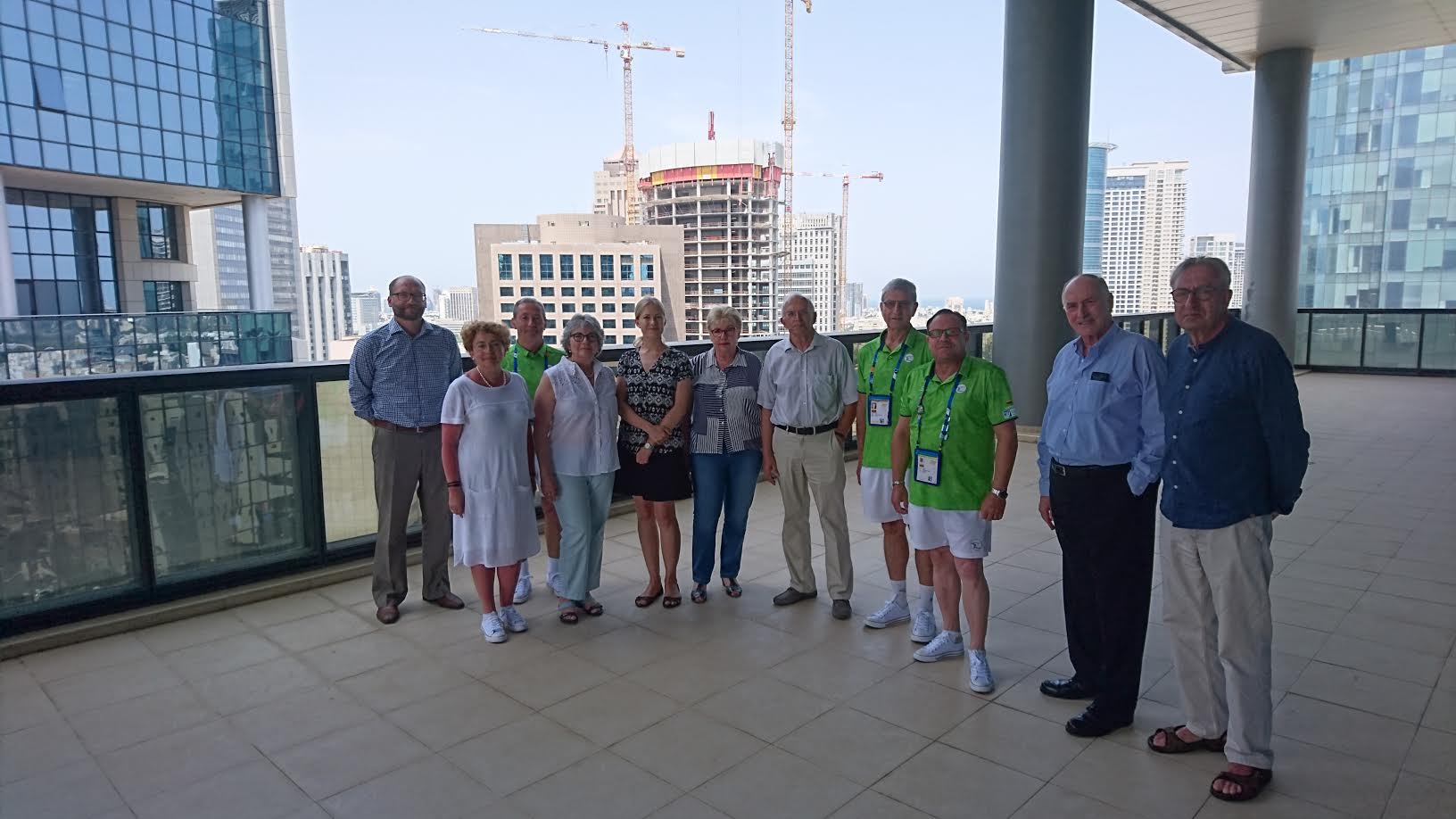
The Lithuanian embassy to Israel held a reception for the Lithuanian Makabi Athletics Club delegation attending the 20th annual Maccabiah Games in Tel Aviv.
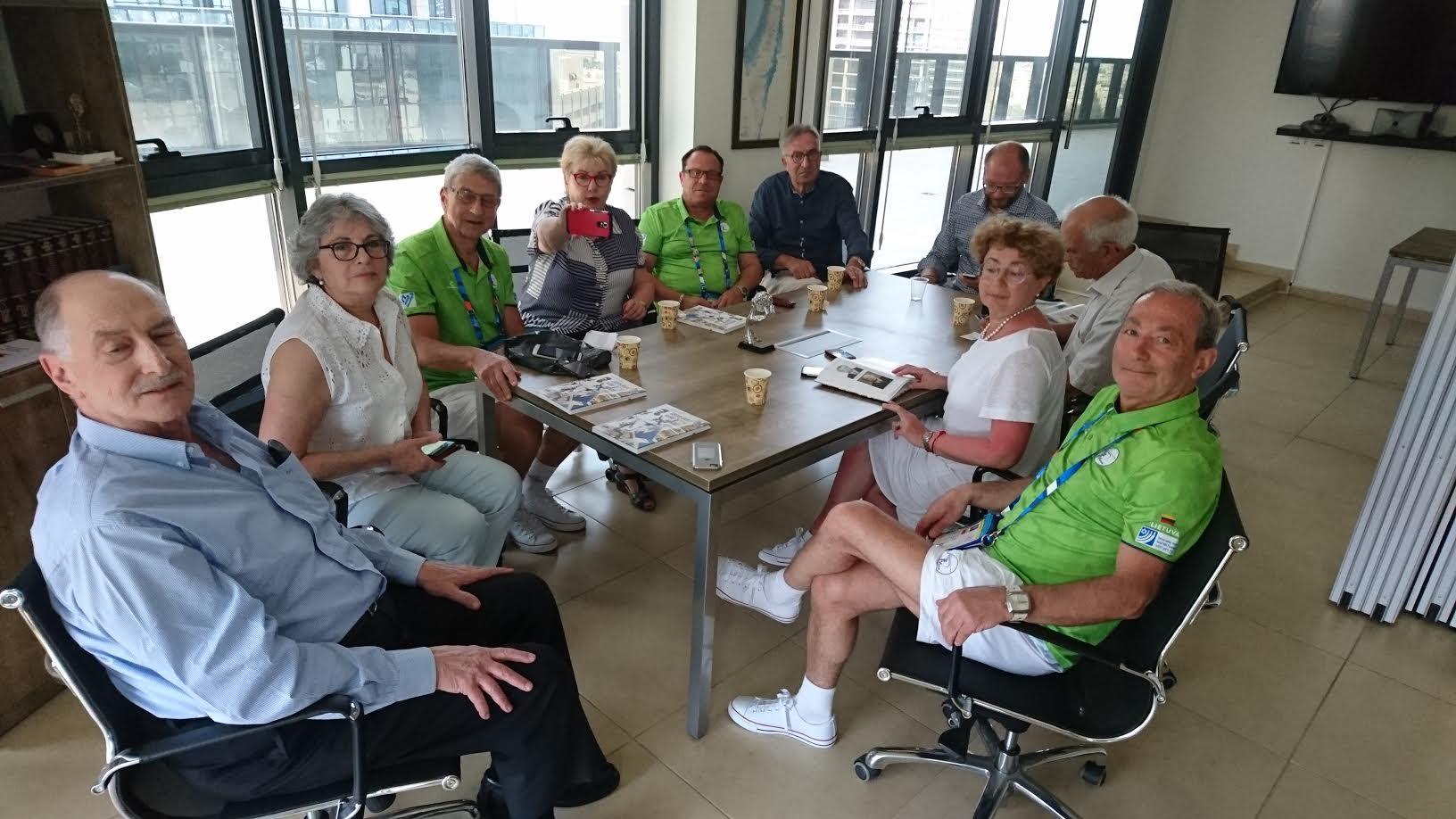
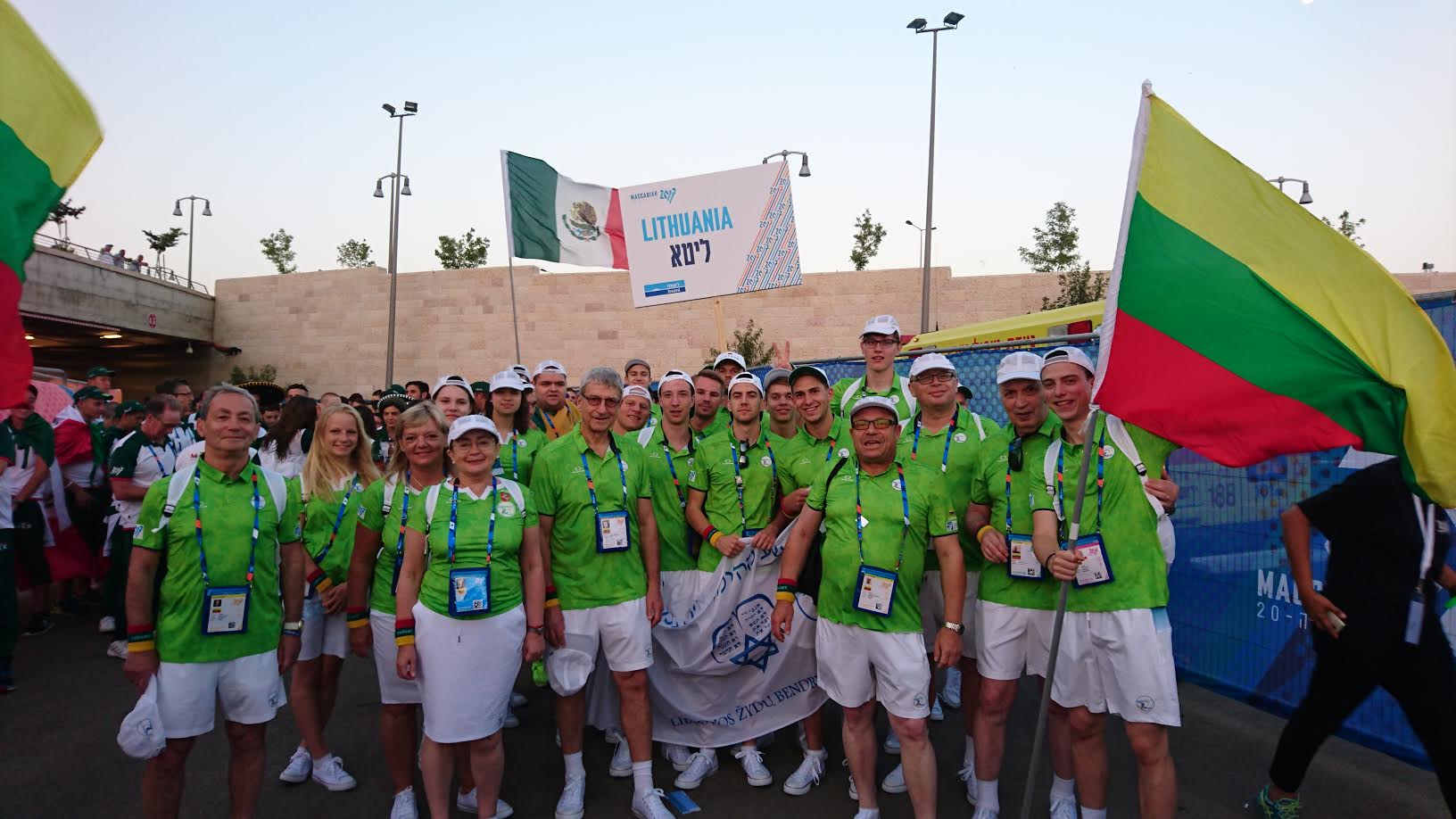
On Lithuanian Statehood Day, the Lithuanian Makabi Athletics Club delegation carried the flags of the Republic of Lithuania and the Lithuanian Jewish Community at the 20th Maccabiah Games in Israel.
The “Jewish Olympics” opened Thursday, July 6, with 10,000 Jewish athletes from 80 countries. The opening ceremony at the Teddy Stadium in Jerusalem was watched by 30,000 fans in the stands.
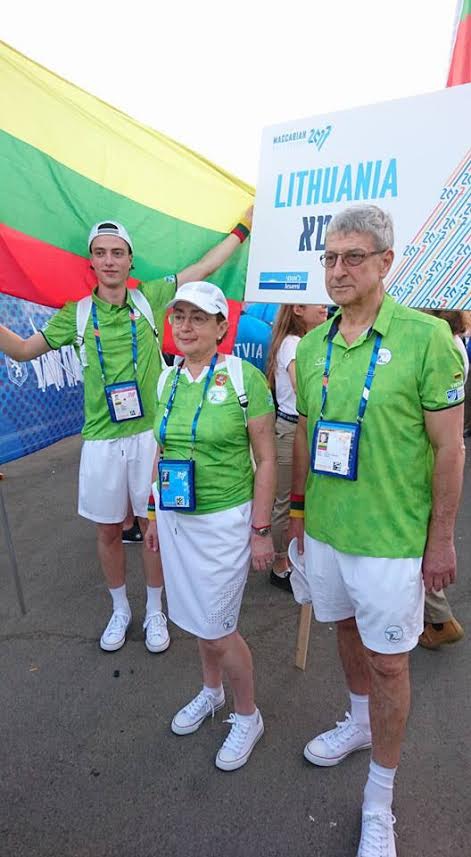
This is the eighth Maccabiah Games to which the Lithuanian Makabi club has sent a delegation. Back in 1989, at the 13th Maccabiah Games, Lithuanian Makabi carried the flag of the Republic of Lithuania, which was only then beginning to break away from the Soviet Union. Club president Semionas Finkelšteinas and club athletes remember the event well.
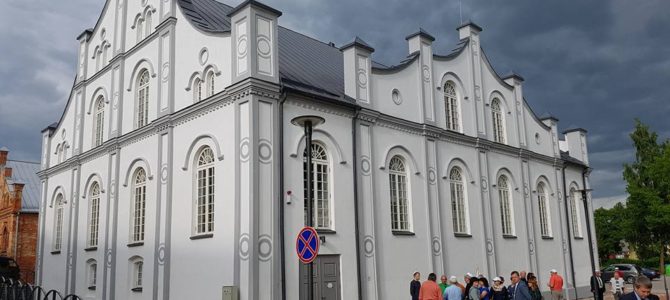
Just before Sabbath on Friday, July 7, 2017, Israeli ambassador to Lithuania Amir Maimon hung a mezuzah on the doorway of the newly-restored white synagogue in Joniškis and he and members of the Lithuanian Jewish Community celebrated the beginning of Sabbath there together.
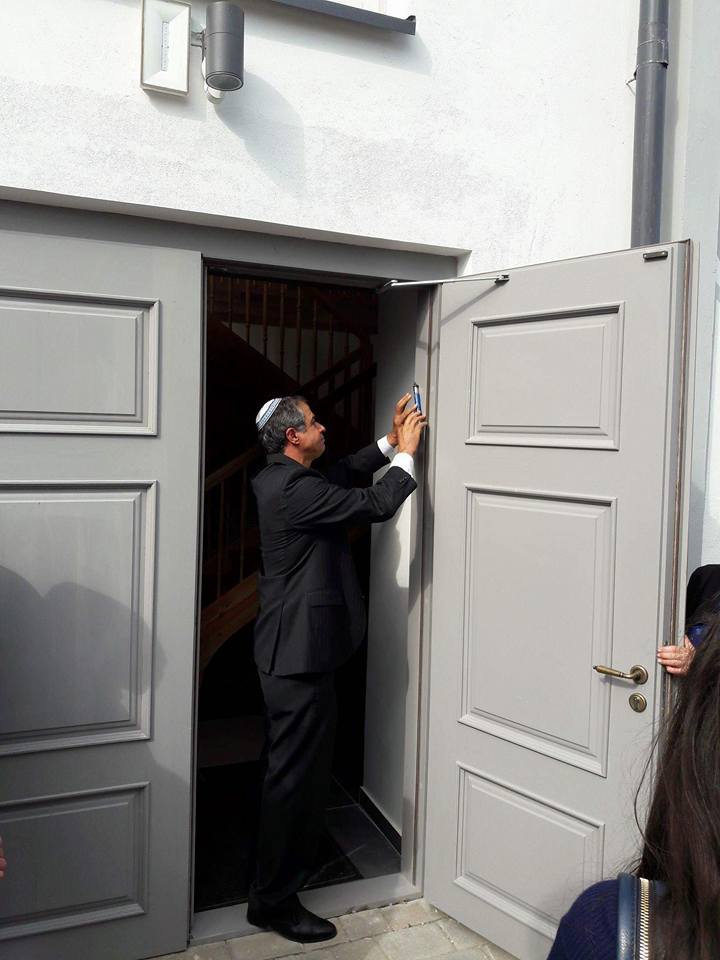
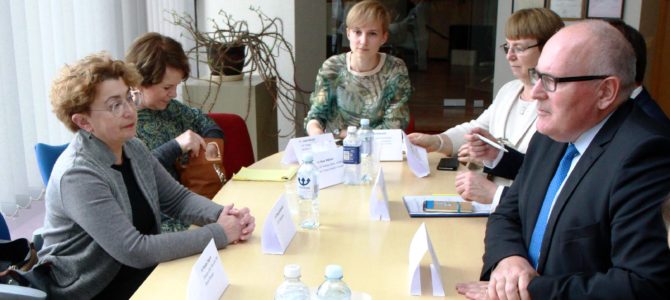
“There is no Europe without Jews,” Frans Timmermans, first vice-president of the European Commission, said during a meeting with Lithuanian Jewish leaders.
The first vice-president of the European Commission visited the Tolerance Center of the Vilna Gaon State Jewish Museum July 3 and met with museum director Markas Zingeris, Lithuanian Jewish Community chairwoman Faina Kukliansky and others there. Arnoldas Pranckevičius, European Commission representative in Lithuania, was also present. Timmermans asked about anti-Semitism in Lithuania. Chairwoman Kukliansky explained Lithuanian Jews, having lived in Lithuania for 700 years, don’t consider themselves an ethnic minority, see themselves as citizens of the country in common with ethnic Lithuanians and aren’t seeking any legal protection as a minority. She also expressed apprehension over solutions to Lithuanian Jewish problems offered by the Government, because governments change and the new Government won’t necessarily support the policies of the former one, leading to a lack of continuity in decision-making regarding matters of importance to Lithuanian Jews.
Based on his long political experience, Timmermans said the only antidote to anti-Semitism is learning Jewish history.
“There is no Europe without Jews,” he said, and stressed the importance of education which provides the opportunity to learn more about and understand Jewish history. Living history, or people who remember the actual events and the Holocaust, are dying, and historians now provide the facts and their interpretation, he noted. He said nostalgia is a kind of new opium. People operate on what they heard as children from adults, and knowing it to be wrong, nonetheless are prone to doubt new facts, Timmermans said. He also said he believed good history curricula are a must.
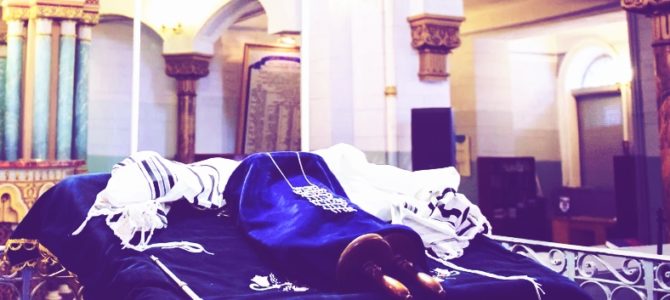
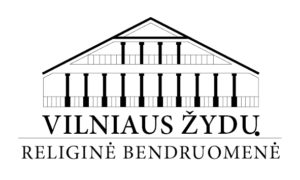
The Vilnius Jewish Religious Community in great concern categorically stands against any plans to build new buildings on the remains of the foundations of the Great Synagogue of Vilnius.
The Great Synagogue of Vilnius was and is the holiest site for Lithuanian Jews. We consider any plans calling for new buildings to commemorate the supposedly non-extant temple blasphemy and the appearance of new buildings a desecration rather than a commemoration.
We consider it an expression of total disrespect that, without asking the Vilnius Jewish Religious Community and without regard to earlier public statements against this by the Lithuanian Jewish Community, certain organizations are undertaking initiatives whose implementation would, without doubt, offend Jewish religious sentiments and bring on criticism by the followers of the Vilna Gaon around the world. We hope organizations which are attempting to initiate construction projects at the Great Synagogue site will take into account the request made by the Vilnius Jewish Religious Community and give up the plans they have announced.
The Great Synagogue of Vilnius, destroyed by the Nazis and the Soviets, or more accurately its remains which are still being investigated by archaeologists, should be left in peace. At the same time, we note there is an abundance of heritage sites in Vilnius and throughout Lithuania which truly need greater attention.
The Vilnius Choral Synagogue, for example, needs greater attention. It still has no ritual bath or mikveh, and needs authentic restoration of its interior.
If something must be changed at the Great Synagogue site, we suggest the sign with incorrect information be replaced, and that the statue to the Vilna Gaon which looks like some sort of caricature be removed and given to some museum in the city. With all respect to the sculptor, it was made without any understanding of Judaic tradition.
We invite those organizations which want to undertake construction at the Great Synagogue site to take into account the real and urgent actual needs of religious Jews.
The Great Synagogue of Vilnius is important as a symbol of annihilated Jewish civilization. There are less ostentation, cultured and respectful ways to mark the site where it once stood, without earth-moving equipment and construction cranes.
Shmuel (Simas) Levinas, chairman
Vilnius Jewish Religious Community
July 3, 2017
Vilnius
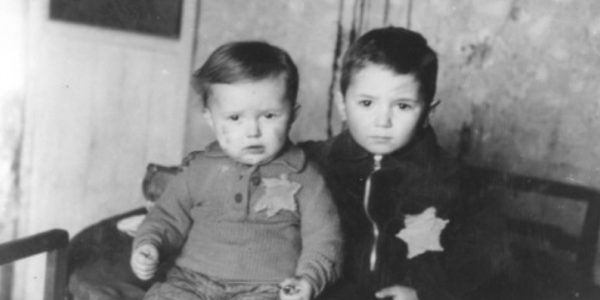
by Sergejus Kanovičius
The weird memory wars continue. Thank God they are being waged only in the virtual arena and, it seems to me, the atmosphere surrounding these memory gun-battles is becoming calmer and more on-topic.
Just last year after one large public event, the term “fellow citizens” began to be used very widely to refer to Jewish Holocaust victims. In one discussion where I objected that it wasn’t useful to underline the fact that “our fellow citizens” were murdered, because beyond the limits of this invitation to repentance remain many non-citizens of Lithuania who were victims of mass murder in Ponar and the Ninth Fort in Kaunas, I was presented with a rather unique argument, which goes something like this: by saying “our” fellow citizens were murdered, we make the victims “our own people,” meaning they become closer or dearer to us. Perhaps. I have noticed that even refined and let’s say modern nationalists who before now have not wanted even to mention the Holocaust, much less the victims, have begun gradually to get used to the idea, which becomes for them a kind of indulgence of forgiveness for saying anything at all on the topic. From among those modern and rather square nationalists you might overhear the following: “Well, since it was our ‘fellow citizens’ who were murdered, that’s a bad thing; killing Jewish ‘fellow citizens’ is unpatriotic.” This is the deconstruction of the nationalist’s reasoning having undergone, excuse the phrase, some degree of liberalization. But what about murdering non-citizens?
I’m not a lawyer, but it seems to me this constant emphasis–sincere or not–on Holocaust victims being Lithuanian citizens tends to undermine any sort of human compassion expressed, whether it be Christian, Jewish or Buddhist, undermining the moral dimension of regret, the feeling when you want to say simply and sincerely: I am sad for them, that shouldn’t have happened. And it doesn’t matter in which country those people held citizenship.
And for those whom the legal aspect is important: let them determine and count how many holders of Polish passports from occupied Vilnius, how many French nationals, how many citizens of independent or Soviet-occupied Lithuania lie buried in those pits. If someone is truly sorrowed for these people, it’s surely not because they were citizens of a certain country.
I was moved to write this by a photograph posted recently on social media; it seems there are people who still remember and remind others of the Lietūkis Garage massacre carried out on June 27, 1941. The photograph has in common with the massacres that it is from another future site of tragedy, the Kaunas ghetto. The photograph secretly taken by Kaunas ghetto inmate Zvi Kadushin (Hirsh (George) Kadish) is of two children. They will be murdered. As will be so many children, so many it seems pointless to write the number.
When we think about regret and repentance (if we are really thinking about it), do we need to note or be interested in the citizenship of these two souls?
Full article in Lithuanian here.

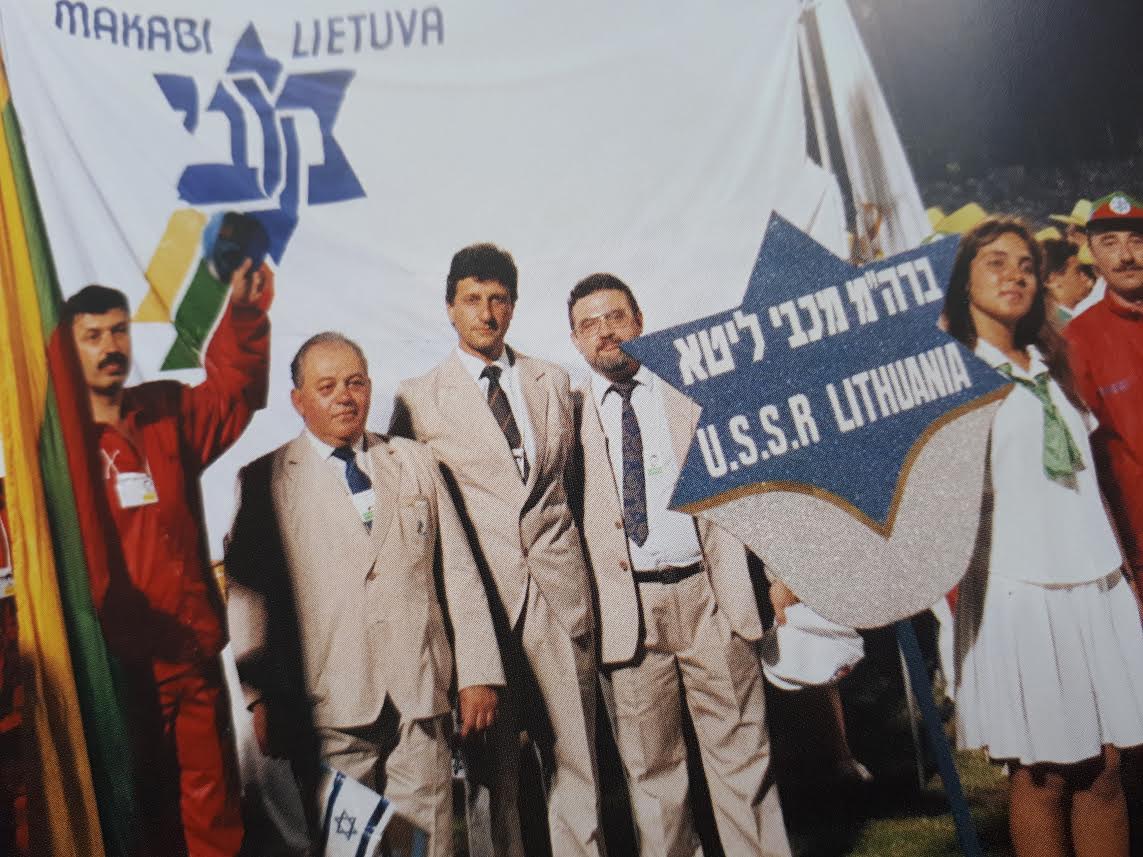
Lithuanian Makabi team at 13th Maccabiah Games opening ceremony, Israel, 1989
The Lithuanian Makabi Athletics Club delegation is leaving for the 20th Maccabiah Games, held once every four years, in Israel, where more than 10,000 athletes from 80 countries will compete.
This will be the 8th Maccabiah Games attended by the Lithuanian team. In 1989 the team was the first to carry the Lithuanian national flag at the opening ceremonies as the country sought independence from the Soviet Union. Club president Semionas Finkelšteinas and club athletes remember well the event.
Semionas Finkelšteinas:
“The Lithuanian Makabi delegation will have 28 athletes in 8 sports: badminton, swimming, mini-soccer, judo, table tennis, tennis, chess and riding. A Canadian rider who has Litvak roots was accepted on the Lithuanian team since Canada didn’t send a team of riders this year. The Lithuanian team includes three former Maccabiah medal-winners: chess player Eduardas Rozentalis who took bronze in 1989, badminton player Alanas Plavinas who won silver in 2013 and Aleksas Molodeckis who took bronze in judo in 2013.
“It’s important to us to participate in the Maccabiah and we never miss a single Jewish Olympics. Whether our team is stronger or weaker, we have always participated and won medals. This time we have five young people, three of whom expect to win medals. We have three badminton players, and the swimmer and strong table tennis player Neta Alon who could be a medal winner. Markas Šamesas and Vitalija Movšovič are our badminton players who could come home with medals. Among the adult athletes the chess player E. Rozentalis, badminton player A. Plavinas, and judo martial artist A. Molodeckij have a good chance of winning medals. Salomėja Zaksaitė, an accomplished chess player, will be competing at the Maccabiah for the first time. Our soccer team is traveling there with their new trainer Arūnas Šteinas. Three of our strong soccer players are unable to attend for various reasons. Artūras Sobolis couldn’t take time off work, Danielius Gunevičius’s trainer won’t allow him to go and Romanas Buršteinas has to attend to family matters.
“All the young people will stay at the best hotel in Haifa. They will compete in the games after which they have a separate program of activities. The swimmers will compete at the Wingate sports complex. Athletes from 80 countries will attend Maccabiah opening ceremonies July 6 and global media always give large coverage to the event, the opening ceremony is covered outside Israel by CNN, BBC and other global televisions channels. The Jewish Olympics takes place once every four years and there is a broad cultural program arranged for all participants. This event is about more than just about sports.